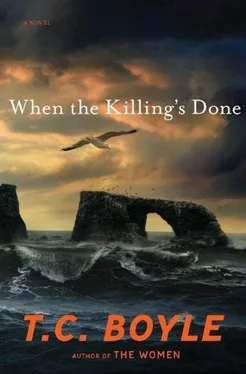On Guam, there was no champagne, because Guam wasn’t snake free and never would be. There were too many species involved, too much vegetation, too many invasives, too perfect a pest. Half a dozen times Robert teased himself into thinking he had a solution, the last being a virus able to survive only in cold-blooded creatures, and he busily inoculated snakes with the pathogen and set them free, but the pathogen didn’t take and there was no noticeable change in the population numbers. He used to joke that the only way to eliminate them would be to nuke the island, and even then it was his bet that some would survive, hidden in a crack in a wall or coiled in a lead pipe. Once, when she was working in the field with him, they discovered a length of PVC tubing no more than half an inch thick and there were six snakes wedged in it, aligned like the wires of a conduit. And now, according to the article he’d sent her, he had a new hope: acetaminophen. Simple, cheap, the active ingredient in Tylenol. A blood thinner, like brodifacoum, but far more selective in what it kills.
Early experiments had been promising. Two three-hundred-milligram tablets, delivered in the carcass of a dead mouse, would kill a brown tree snake, through internal bleeding, in three hours. Yes. But how to deliver it? Robert and his colleagues had air-dropped a thousand Tylenol-laced mice over a carefully cordoned-off section of forest, but most had become hung up in the branches and gone to rot before the snakes could discover them and there was the further question of what the bait would do to non-target animals. Plus, how many mice would it take? How many drops? There were estimated to be upward of two million snakes on the island and even if the staggering amount of funding for that kind of operation could be raised and even if the agent was found to be non-reactive with other animals, the chances that all the snakes could be eliminated was, roughly — or no, exactly — zero. They were there for good. And so the native trees would continue to decline because there would never be birds sufficient to broadcast their seeds, and the spiders and insects would thrive, and in a hundred years, fifty, Guam would no longer be Guam.
The sun is in her eyes and she has to pinch them shut to tip back her head and allow the cool affirmation of the wine to trickle down her throat. She will give her little speech, hand out her press release, lie back on a blanket with Tim and watch the birds slip overhead against a sky drawn back to the infinite. This will be her reward, her peace, her joy. She has been an instrument of good, striking down the invaders that plagued her grandmother in her distress all those years ago and for all the years hence wrought havoc on the eggs and unfledged chicks of the birds that evolved to roost and breed in a ratless world. Well, she’s given them back that world. Given them a chance. And now, as she’s about to avow publicly on the raising of the next glass, she is prepared to move forward, undaunted, with the aid and guidance of Freeman Lorber and all the other incomparable people of the National Park Service, Channel Islands, to the far bigger challenge of Santa Cruz.
“Santa Cruz!” she’ll call out, the bludgeoning trochee rising from deep inside her like a war cry while they lift their glasses in unison, in support and encouragement and as a mark of their commitment to the cause, right-thinking people, educated people, caught up in the intoxication of the moment in this place she’s come to love more than any other on earth, more than Hawaii, more than the Berkeley Hills, more even than Guam. “On to Santa Cruz!”
And then it’s the next morning, a Sunday, fresh-squeezed orange juice, bagel with cream cheese, the newspaper. Tim’s habit is to sleep late whenever he can and today is no different. When she slipped out of bed at her usual time — six-thirty — he was hunched under the blankets, breathing lightly, looking as if he’d sleep till noon, and she saw no reason to wake him. Let him sleep. Her life isn’t like one of those soft-focus movies where couples moon at each other over poached eggs and coffee out of cups the size of salad bowls and then stroll hand-in-hand along the beach — no, it’s real, and she has a real relationship with a living breathing man who likes to sleep later than she does. And so what? Good for him. Tim has his life, she has hers. And when they intersect, so much the better.
Outside, the fog is already lifting, the sun emerging as a pale presence among the trunks of the trees, till suddenly, in a single burst, it slices through the window to illuminate the kitchen, taking hold of the stainless-steel knobs of the oven and the glass lens of the clock on the far wall. The yard jumps to life. The begonias fire. Morning in Montecito. She’s had a lazy glance at the headlines — Bush and his war — and filed the dishes away in the dishwasher. There won’t be anybody on the beach this early but for a handful of dog walkers and joggers, or at least that’s her hope, and so she slips on her sneakers and heads out the door and into the morning.
On down the block, past the hotel and its Lucullan expanse of lawn, the air cool and fresh still and no cars moving along the access road out front. Cutting diagonally across the blacktop, she takes the direct route to the stairway down to the beach. She doesn’t follow the tide charts — no time to bother, and besides she’d rather be surprised — and so she feels a little lift to see the expanse of wet sand running out to the flats cobbled with the slick dark mounds of boulders rubbed smooth by the twice-daily shifting of the waters. Low tide. When the tide’s up full, the waves beat at the seawall and she’s reduced to taking the sidewalk above it. This beach, directly across from the long tan smudge of Santa Cruz on the horizon, doesn’t catch the big waves, which tend to run lengthways down the channel, and so isn’t especially interesting as far as beaches go. It’s pretty, no doubt about it, but there isn’t much by way of tidepools and relatively little washes ashore. Aside from trash. And dogshit wrapped in neat little plastic bags. Does that drive her crazy? Yes, it does. That people should take something natural, waste, feces, the end product of an animal process, and seal it in plastic for future archaeologists to unearth from the landfill in a thousand years is pure madness. This world. This skewed and doomed world.
But here she is, on the beach, weighing her options — right or left? — before deciding to turn right toward the bluffs that wrap around to Santa Barbara proper and the pier beyond and all the mad crush of civilization that comes with it, thinking there might be something of interest among the slabs of rock that have successively peeled away from the cliff face over the years and come crashing down into the surf. When the tide is exceptionally low, as it looks to be now, a reef is exposed there, with some scattered pools hosting the usual suspects — mussels, barnacles, urchins, winkles, anemones and hermit crabs, in addition to the occasional surprise of a brilliant blue-and-white nudibranch or stranded octopus. The carcass of a juvenile gray whale had washed up on the rocks there one spring — bearing what had to be wounds inflicted by a great white — and summer before last, during a dinoflagellate bloom, she’d come upon a crowd of people gathered round a seal pup, trying to urge it back into the water, when clearly it had drawn up on the beach to warm itself.
The animal was obviously undernourished — she suspected domoic acid poisoning as a result of the toxin concentrated in the plankton working its way up the food chain and delivered in its mother’s milk — and when she reached it, a shaven-headed young Latino in a wife beater was attempting to drag it over the rocks and back into the sea. Before she could think, she was on him, furious, snatching at his arm and trying, for all his bulk, to pull him away. There was a screaming in her head — here was yet another well-meaning animal lover doing exactly and precisely the wrong thing, the fatal thing — and she could feel the blood rush to her face. “Let it go!” she barked, rigid with anger, locked there — her hand fixed to his arm as if it were mechanical, made of nuts and bolts and titanium tubing — until he obeyed her. And then, as the pup fell away from his grasp and he gave her a look of such confusion she almost felt sorry for him, she added, in a voice of steel, “Stay back, all of you.”
Читать дальше












